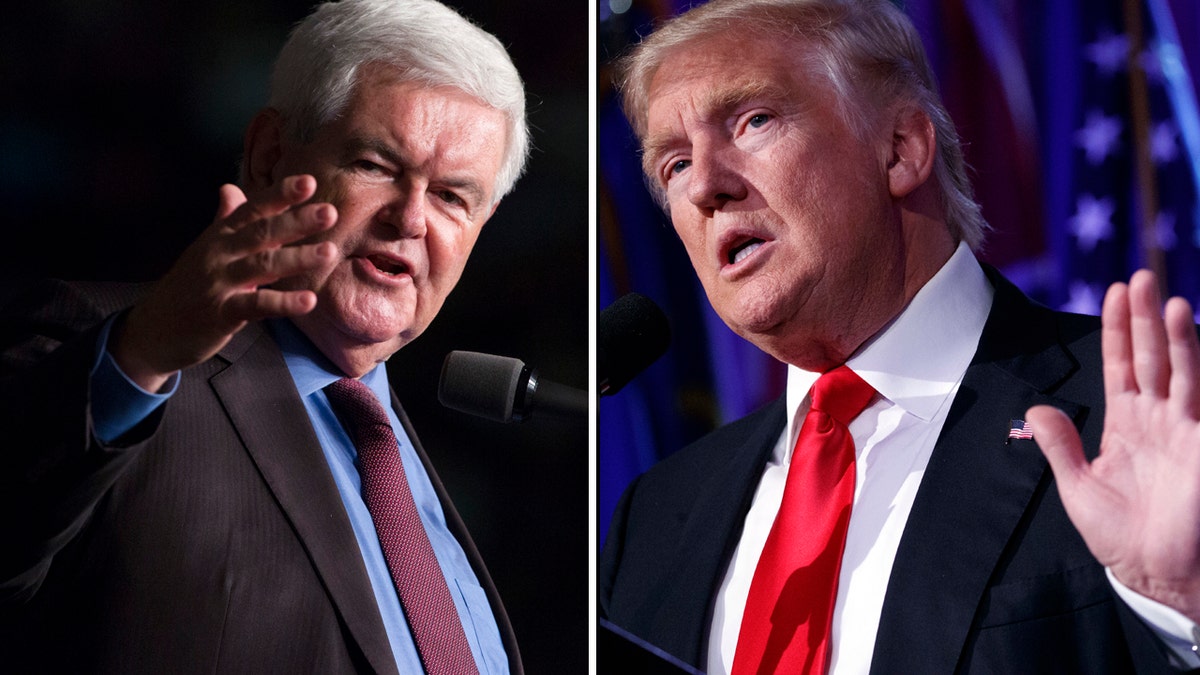
Former House Speaker Newt Gingrich, left, and President-elect Donald Trump (AP)
EDITOR’S NOTE: This column will be the first in a series of four columns this week examining how Trump’s health care plan, which will be referred to as THP, may look under his new leadership based on statements he has made and policymakers he has aligned himself with for his transition team and administration.
Before President-elect Donald Trump hit the campaign trail vowing to repeal and replace ObamaCare, former House Speaker Newt Gingrich had ideas of his own about the Obama administration’s Affordable Care Act. With Gingrich shaping up to be a Trump advisor, a look at what the man who spent 20 years in the House of Representatives has said about ObamaCare in the past, as well as what he put forth during his own 2012 presidential bid, may offer insight into what Trump’s health care plan (THP) will look like.
Gingrich, who once advocated for a 100 percent insured nation, described the ObamaCare insurance mandate as unconstitutional during the 2012 campaign, but supported the idea in the past.
When pressed, Gingrich said he proposed mandates as a free-market alternative to Hillary Clinton’s plan and past plans mirroring what he considered to be socialized medicine, but he changed his stance when he discovered a plan based on tax breaks for individuals who purchase health insurance. The tax breaks-based plan would see unused credits go toward a pool for the uninsured who could use them to cover costs of whatever limited care is available should they become ill.
Gingrich also spent time on the campaign trail lauding his record on Medicare, which he said he helped save from bankruptcy. He enacted a budget measure known as the sustainable growth rate formula which reduces payments to physicians to balance the budget. The idea stems from his belief that the government can’t cut reimbursements if it can’t cut patient care costs. Gingrich again advocated for a credit-based or voucher-based system, in which the poor are given money to buy their own health care to lessen costs over time. This plan is not entirely different from that of current House Speaker Paul Ryan, who also put forth a plan that involves converting Medicare from an entitlement program and giving beneficiaries a certain amount of money to buy private health plans instead.
This type of reform would put the power in the hands of the states, which Gingrich feels could better address the shortcomings of Medicare in the present rather than the government scrambling to find a single solution over a longer period.
As recently as 2015, Gingrich went on record saying that he didn’t think ObamaCare should be repealed, and that congressional Republicans who say they want to overturn it aren’t being truthful.
He told a health conference that more minor parts of the law that aren’t working should be addressed, but the core parts have bipartisan support. The move signals that he hasn’t swayed too far from his original belief that the United States should be 100 percent insured. It also falls in line with Trump's plan to at least consider two provisions that President Obama suggested stay in place, which is to allow children to stay on their parents’ health plan until age 26, and to prohibit insurers from denying coverage based on preexisting conditions.
In 2011, Gingrich told a CPAC audience that there are four necessary steps to take when considering how to best transform our health care system. The steps included medical education debt forgiveness, cuts to inefficient programs, a more transparent way to deliver products and a radical transformation away from population medicine to better personalize medicine, which would include modernizing the FDA.
I feel confident in saying that Gingrich will likely push for some of these ideas while advising the Trump administration on THP, and there is consensus along the party line for many of them. Medicare reform, more state power and less bureaucrats in the exam room seem like reasonable goals for the administration rather than tackling the task of inventing an entirely new health plan in four short years.